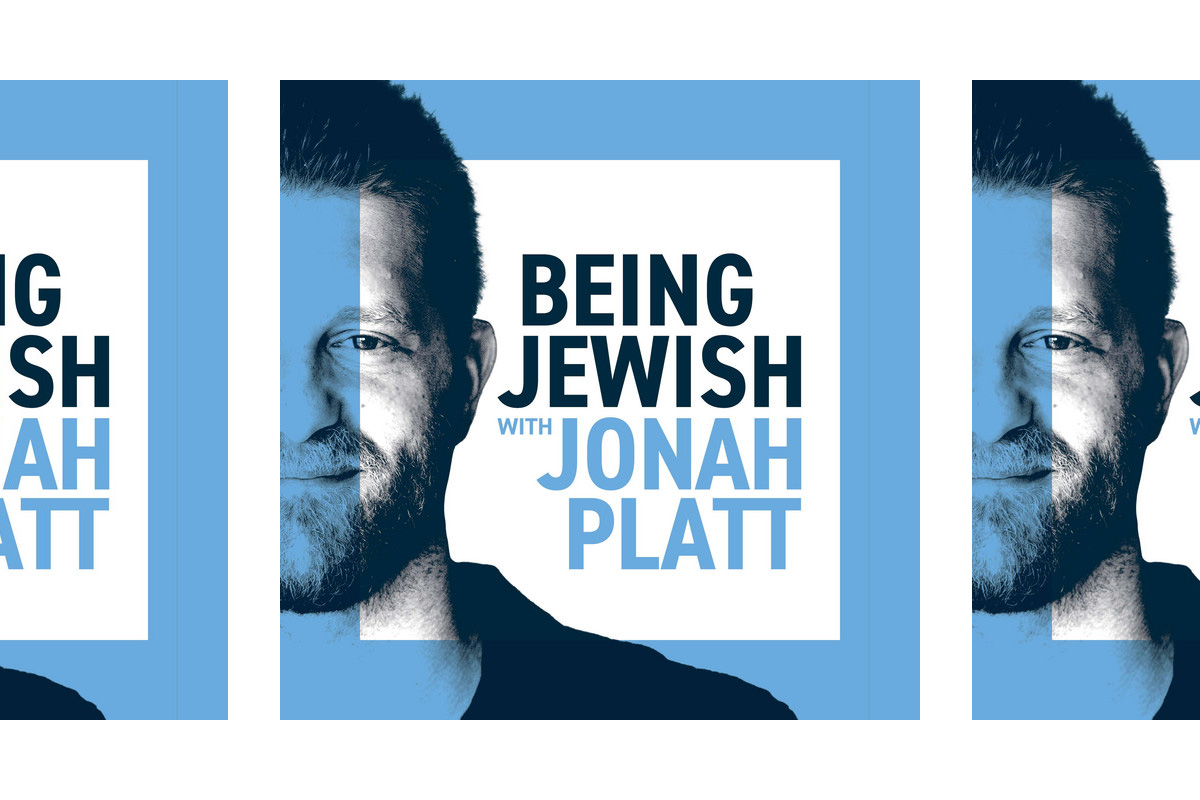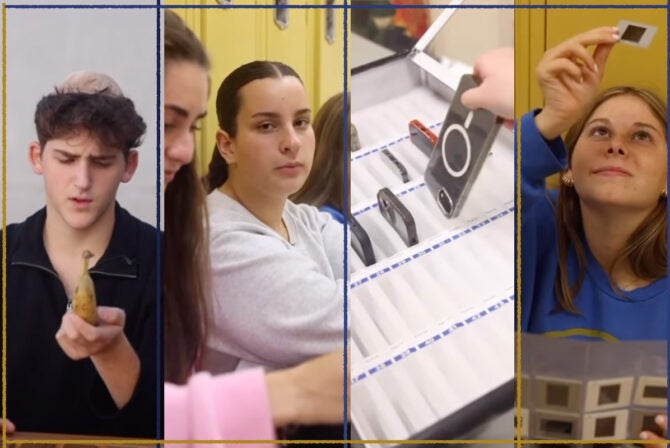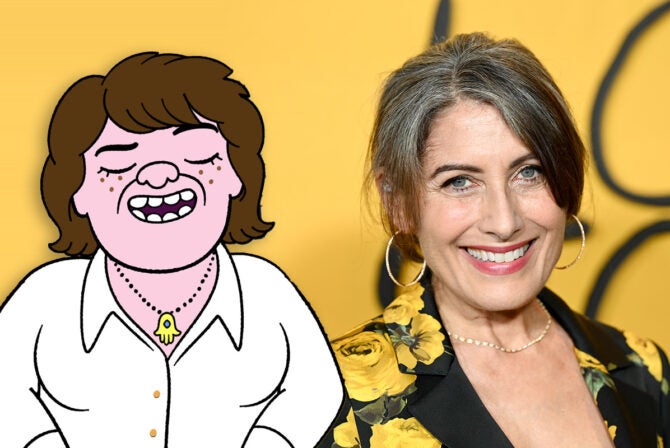Since October 7, a lot of people, especially celebrities, have become unlikely activists. That’s not really what happened to actor and singer Jonah Platt, who has played Fiyero in “Wicked,” has had countless stage, film and TV roles, is a father of two with dancer Courtney Platt and who sometimes sings beautiful Jewish music with his brothers Ben Platt and Henry Platt.
Jonah has long been a Jewish activist (he is also a member of the board of 70 Faces Media, Kveller’s parent company). Along with his work in the entertainment world, Platt has long been led by a mission to make fellow Jews feel prouder and more connected to their Jewish identity and to share facts and perspectives about Israel. But just like so many of us, October 7 changed him forever.
A few days after the harrowing Hamas attacks, he got on his Instagram for a live Q&A that ended up getting over 100,000 views. Since then, he’s posted a series of reflections (and one excellent ’90s Passover parody) on his social media. And this month, he released his first podcast, called Being Jewish with Jonah Platt. While Platt’s own opinions about Israel and politics are fairly clear to any of his social media followers, he didn’t create this podcast to convince anyone to think just like him — instead, he’s there to share diverse Jewish stories from personalities, some of whom aren’t necessarily known for their connection to Judaism.
So far, Platt has had actor Skylar Astin, singer and activist Montana Tucker, Rabbi David Wolpe (who officiated his bat mitzvah, his wedding and his bris), music manager Kenny Hamilton and Jerusalem Deputy Mayor Fleur Hassan-Nahoum as guests on the podcast. Conversations ensue with each guest about what makes them happy to be Jewish, their family’s Jewish history, how October 7 changed their connection to their Jewish identity and their own connections to Israel. At the opening of each episode, Platt also talks about hot topics that are important to the Jewish community, from the presidential election to his argument for ditching the term antisemitism for “anti-Jew hate” to reflections on Yom Kippur and the concept of empathy.
Kveller spoke to Platt on the morning before Rosh Hashanah, just before he set off on what would end up being a life-altering visit to Israel on the anniversary of October 7. On top of telling us about his mom’s epic High Holidays feasts, we spoke about what he wants people to take away from his podcast, Jewish pride and his dream guests.
So first things first: Why a podcast, and why now?
I was just looking for what my contribution would be in this moment. I have been doing stuff online — making videos and connecting with people there. A podcast felt like a natural expansion of that, where I now get to speak more about topics I want to speak about.
I say this in the first episode, but this whole year has been so reactive. I wanted to get back to my pre-October 7 mission for Jews, which is to help people, empower them to take more ownership of their Jewish pride, to help Jews and non-Jews understand how different being Jewish can look for people. I see conflicts within the community on that, and I see misunderstanding from outside the community on that.
I also really feel like it’s a service, in a way, to some of these guests who don’t get the opportunity to go to these places openly or explain themselves, or say, “Hey, here’s what it feels like to be me and be Jewish in my field.” So it just seemed like such a right fit, to check a lot of boxes, to empower and help a lot of folks.
In the second episode, you are making the “Jewish case” for both Kamala Harris and Donald Trump, which I found so interesting because you’re creating the podcast as a space where you can have a conversation with people with such a wide range of beliefs.
When people ask what kind of guests are you looking for, my baseline is: Every guest is going to be celebratory about being Jewish. That’s the show. I’m looking to bring Jewish people together and non-Jewish people together with Jewish people in a safe space for this exploration, for people to feel like they can just talk about things without being judged and without getting angry. I’ve been able to have great conversations in real life with people who I totally disagree with. It’s just all about how you approach it: respecting and honoring the other person and knowing that the world’s not going to explode if this person disagrees with me, which is somehow, sometimes, how we act to one another. So yeah, I mean, as I said in that Trump/Kamala thing, my goal there was just to get Jews to be nice to each other and remember that we’re all Jews first, and we’re not insane for making personal decisions.
The topics of Judaism and Israel are ones that people are sometimes so reticent to address on the record. Is that something you have experience with?
There’s a few ways to answer that. One is: I have some people who say no to appearing on the show when I ask them, and it’s very clear they are not ready or comfortable to talk publicly about being Jewish, which is very sad to me.
For the people who come on, the show is not a “gotcha journalism” show. It’s not meant to be incendiary. I’m not going to corner anybody, and it’s not meant to be political. Obviously I talked about politics in my second monologue. But these conversations, unless I’m talking to someone who works in politics, are probably not going to go anywhere political. We’re just going to be talking about these people’s individual experiences of being Jewish.
There’s this perception that talking about Jewish things is somehow hot-button, and it’s not. We have to start putting it out there and normalize. Talking about Jewish stuff is normal. It should be acceptable. It shouldn’t make people pause or hesitate because there’s going to be some boogeyman… People aren’t even sure what they’re afraid of. There’s just a fear to talk about it, something bad’s going to happen. It’s just not true. And so that’s part of this show, too, just making the safe space where people can have these conversations, and the audience can see, oh yeah, there’s, like, a bunch of other Jews, even famous ones, who like talk about the same stuff I talk about at home. This is normal, and there’s nothing wrong or hot-button about it.
I love the episode with Skylar Astin. I thought it was so cool to hear him talk so openly about being Jewish.
He’s so insightful. I mean, I really loved our conversation.
He was so open. You spoke a lot about authentic casting of Jewish actors in Jewish roles — which I was just thinking about him in relation to the new “The Last Five Years” on Broadway starring Nick Jonas. I felt like Skylar would be perfect in that lead role.
I saw that. I was like, of course, here we go again.
No offense to the Jonas Brothers…
They’re the least Jewish guys you can imagine, and the role is so Jewish. But that’s show business for you.
Do you have a dream guest for the podcast?
Pink has reposted my videos before and I know that she cares about being Jewish and isn’t able to, or feels unable to, express it in the way she might want to, so to me, she’s the perfect guest for this show — someone who has a big reach, a big audience, who identifies as Jewish and hasn’t been given a safe space to come there.
Whenever she’s talked about being Jewish, she’s been so insightful. I can’t stop thinking of this one video where she made kugel on TikTok live.
It’s a big part of her identity. I would just love to be able to go deep with her. There’s Sebastian Maniscalco. He is a hilarious Italian-American stand-up, not Jewish, but married a Jewish woman, and talks a lot about the sort of Italian Jewish dynamic in his stand-up, which is my dynamic. My wife is Italian American.
You can be each other’s mirror image.
Although, my wife ended up converting, and he did not. But I just feel like he’s never gotten to speak about that deeply in a way that wasn’t like a bit in his act. I think the audience would be so interested to know: What does his life actually look like? How much Jewishness is there in it? Has being married to a Jew since October 7 changed things for him and his family? I think it’d be super interesting.
Can you tease any upcoming guests?
Van Jones, which I’m really excited about. Van has been an unbelievable ally to the community, and I don’t think people widely know that enough. I’m really excited to speak about that, and for people to hear about that. There’s three siblings who are Latina Jews who all live in Arizona, and all work in Arizona government: the Hernandez siblings. So all three of them [will be] on together, and they’re also friends of mine — that’ll be really fun. Then I’m interviewing Gail Simmons pretty soon.
That’s so exciting, we love Gail. Have you had any very surprising or really illuminating moments in these interviews?
I really enjoyed hearing Kenny Hamilton’s perspective on being a Black Jew. I think that’s a perspective we don’t hear a lot. I asked him: Was the community welcoming to you? And he was like, the Jewish community was super welcoming to me. That almost surprised me, because I’ve heard stories of communities not being welcoming to Black members, like anytime a Black person goes into a synagogue they get like, “Can I help you?” But [Hamilton] said that’s not the community that’s been giving me trouble, it’s been the Black community who’s like, “Why’d you go and do that for?”
I just yesterday did my next episode with Rabbi David Wolpe. Just tons of illuminating stuff. I’ve known him my whole life, so we have a nice rapport. And he’s such a smart, interesting guy. I usually aim to have people who are not known for being Jewish, and get them to talk about it, but I had a guy who was known for being Jewish, so like, let’s talk about some Jewish stuff. We went in on some theology and philosophical questions and meanings of being Jewish from a rabbinical perspective. So it’ll be a unique episode.
What was the driving moment that made you into a Jewish activist?
There were two or three big moments, sadly having to do with conflict. The first was in the spring of 2021, when there was violence between Gaza and Israel over the Sheikj Jarrah neighborhood and Al-Aqsa. That was the first moment where I was like, OK, I’m seeing on social media so much craziness being spouted. People don’t know what’s going on. That was my first time when I was like, I think I can help break this down for folks and just help people understand what’s real and what’s not. So that’s when I started stepping up my presence as a Jewish social media advocate.
The next moment was in April of 2023. I went to Israel to be a fellow of the Tel Aviv Institute that Hen Mazzig runs. That was a really inspiring trip, because it brought together 20 influencers from across the world who are all Jewish, but not necessarily a Jewish presence online. And the big takeaway from that was: We are a big community. There’s a lot of us, and a lot of them were so devoted to their social media work. I was like, I should step up my social media work. I can have more of an impact.
And then, of course, October 7, as it did for so many people in so many ways, poured gasoline on the fire. There was so much more necessary. There was more opportunity to help people. There was so much that people needed to understand and needed to hear, whether that’s defending things or explaining things or pointing things out or observations.
Do you think you’ll bring any of your family into the podcast?
I’d like to. I haven’t broached it with my brother Ben yet, because he was on his honeymoon, and I didn’t want to bug him with work things. So that’s a conversation we have to have. I asked my dad. He was like, “Nobody wants to hear from me.” I was like, “We’ll see.” And I’m definitely going to have my wife on. She has such an interesting story and Jewish journey that I think people will really resonate with. So I’m saving her for a special episode.
What else are you working on right now?
I’m trying to work on less, so I can focus on this show. But I’m producing a Jewish film, which I mentioned in the Montana [Tucker] episode, called “The Mensch” that I’m excited about, starring Ginnifer Goodwin. I’m going to be in it myself as well, and going to get some other great actors in there. I have been, for many years, part of the team that’s making a musical stage adaptation of the book “The Giver.” We turned in a draft on Labor Day weekend, and it looks like we’re going to be picking it up again sometime in the near future to work on the next phase of getting it on stage.
What are you hoping that people take from the podcast?
I want anyone listening to see that they deserve to respect themselves for being who they are, and to take pride in who they are, and that there’s nothing wrong or offensive about being proud of who you are, no matter what anyone else says. If that somehow bothers someone else, that’s their problem — that’s not your problem. And for people to feel that they’re part of a community, and they’re not alone. There are other people watching this show and appearing on this show who have the same feelings and thoughts as they do, who care about the same things as they do, and you know that we’re all in this together.
You can listen to “Being Jewish” on Spotify, Apple Podcasts or wherever you get your podcasts, and watch it on the Jewish Broadcasting Service.








